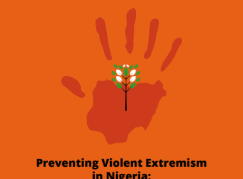By Saheed Muhammed
While extremist ideologies are promoted by the malicious activities of ethnic mili
tias, religious or secessionist movement and moral/value decay at community levels, violent extremism is enabled by unattended socio-economic challenges, unchecked ideology, illiteracy, political instability and insecurity.
It is worrisome that Nigeria continues to be significantly impacted by terrorism and violent extremism, ranking as the eighth most impacted country globally, according to the 2023 Global Terrorism Index.
As observed by the United Nations Office on Drugs and Crime (UNODC), Nigeria faces profound challenges posed by terrorism and counter-terrorism efforts, most notably, as a result of the activities of terrorist organizations and its affiliates in the North East. This has resulted in civilian casualties, prolonged internal displacement, cross-border movements, substantial economic losses, and increased risks of multidimensional poverty for affected communities.
Apparently, terrorism and violent extremism are enabled by weak institutions and bad governance, porous borders, poverty and unemployment, illiteracy, technological advancement, religious division, indoctrination and ideological commitment, arms proliferation and trafficking, historical grievances and injustice.
Recent engagements by the Civil Society Legislative Advocacy Centre (CISLAC), financed by GIABA-ECOWAS, have revealed that poor awareness at community levels of collective monitoring and timely response to warning signals of potential terrorist activities and violent extremism, exposes the North East to the increasingly complex and uncertain security situation, as various non-state armed groups have emerged and consolidated coercive power to terrorise the region.
It is important to understand that violent extremism thrives through poor awareness at community levels of the radicalization process as well as the potential impact of social extremists’ activities targeted at undermining social cohesion, peaceful co-existence, tolerance and literacy.
Poorly monitored borders pave way for easy movement of goods and services used in facilitating terrorism and terrorism financing. Nigeria shares borders in the North with Niger Republic, in the North-East with Chad, in the East with Cameroon, and in the West with Benin Republic; with nearly 1,500 identified land border crossings as of 2016. Of these, only 114 reportedly had approved control posts manned by immigration officials and other security agencies.
It is critical not to downplay the role that economic factors, such as poverty and lack of economic opportunities, in enabling violent extremist groups to recruit for violent extremism and terrorism from among local populations the countering violent extremism community. Experience from the North-East has revealed that a small portion of populations that experience social deprivation turn to violence and join extremist groups as a way of escaping such and underlying conditions.
On a similar note, in 2017 Report, the USAID Center for Resilience warns that over-focusing on the underlying socio-economic conditions such as poverty must not result in an underestimation of individual psychological factors along with the role of human agency and the degree to which those who voluntarily join extremist groups do so by choice; as extremist groups have made reference to identity, existential threats, corruption, cultural domination, and hate as major motivating factors.
More importantly, while terrorists or terrorist organisations need money to acquire weapons and other equipment, recruit supporters, facilitate logistics and feeding, provide shelter and the general upkeep of their members, the banking sector continues to offer opportunities for terrorist financing; as current measures employed by banks have proven ineffective for increasing knowledge gap of the tactics and concrete methods employed by terrorist financiers.
It has been reported that most violent extremists fund their activities through commercial enterprise, using natural resources, multiple small donations, and illegal means like ransom, extortion, smuggling, drug and human trafficking, and illegal weapons trading. Without access to legal or illegal money they will be unable to purchase any weapons or supplies to carry out their plans.
Consequently, controlling the flow of money to terrorist organizations is important if terrorists’ activities must be mitigated. It has become imperative to strengthen regulations in the financial sector to counter unscrupulous financial activities of the Bureau de Change operators, Binance, Point of Sale (POS) devices, wire transfers, and Designated Non-Financial Businesses and Professions, among other enabling platforms, exploited for terrorism financing. These measures cannot be achieved without strengthening the Anti-Corruption Institutions and other regulatory agencies through adequate technical capacity and resources to detect and disrupt the financial networks of terrorist organisations.
It has become imperative to demonstrate holistic effort to address poverty and illiteracy, bad governance and corruption, socio-economic inequalities, promote social inclusion, and foster a sense of belonging that are essential for preventing violent extremism.
Moreover, associated early signals of violent extremism like idealization, recruitment and propaganda, indoctrination and brainwashing, must be clearly observed, properly monitored and timely reported through trust building and enhanced community engagement mobilisation and support. While trauma, mental health issues, and psycho-social needs must be integrated in community engagements, to prevent indoctrination.
Muhammed, a Researcher and Policy Analyst writes from Abuja

